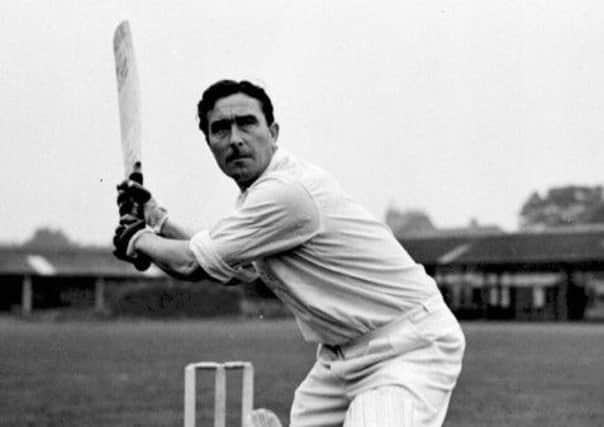Sporting Bygones: How grandfather Denis set the example for Compton with Ashes century at Trent Bridge


It is a fair bet, too, that Nick’s grandfather, Denis, raised a celebratory gin and tonic as he looked down from the celestial pavilion in the sky.
Some 85 years earlier, Denis had scored his own maiden Test hundred in the opening match of the 1938 Ashes series at Trent Bridge.
Advertisement
Hide AdAdvertisement
Hide AdWhereas Nick was 29 at the time of his breakthrough innings, Denis had just turned 20 and was playing only his second Test; he had scored 65 on debut against New Zealand at The Oval in 1937.
As was the case at Dunedin’s University Oval, where Nick Compton made 117 in the second innings, the Trent Bridge pitch was a batsman’s paradise.
When Denis Compton walked out at No 6 on the opening day, England were 281-4 after captain Wally Hammond had won the toss.
The innings had been given a flying start by Charlie Barnett and Len Hutton, who compiled an opening partnership of 219.
Advertisement
Hide AdAdvertisement
Hide AdBarnett, the Gloucestershire batsman, hit 126 before he was first out, bowled by pace bowler Ernie McCormick.
Like Compton, Hutton also marked his first Test appearance against Australia with a century, contributing exactly 100 before falling lbw to left-arm spinner Chuck Fleetwood-Smith.
And after Bill Edrich departed for five on Test debut and Hammond for 26, both bowled by leg-spinner Bill O’Reilly, Australia were just threatening to peg things back.
Enter Compton, who joined Lancashire left-hander Eddie Paynter with the responsibility of ensuring England’s good start did not go to waste.
Advertisement
Hide AdAdvertisement
Hide Ad“As so often, I was lucky,” recalled Compton in his 1958 autobiography ‘End of an Innings’.
“Before I had scored, I was dropped off O’Reilly by the great Don (Bradman) himself, and I can still remember how I sighed with relief.”
When Compton eventually fell for 102, caught on the boundary by Jack Badcock off Fleetwood-Smith, England were 487-5, the Middlesex man having added 206 with Paynter, who reached 216 not out.
England declared on 658-8 – then the highest total against Australia.
Advertisement
Hide AdAdvertisement
Hide AdThere followed one of the greatest innings in Test history...
Stan McCabe, the short and stocky New South Welshman, scored 232 out of a total of 411 before skying the Yorkshire left-arm spin bowler Hedley Verity to Compton at cover.
When he returned to the pavilion, McCabe was greeted by Bradman, who told him: “If I could play an innings like that, I’d be a proud man, Stan.”
Despite McCabe’s heroics, which helped lift Australia from a perilous 194-6, they were not sufficient to prevent the tourists from following-on.
Advertisement
Hide AdAdvertisement
Hide AdHowever, England’s hopes of forcing a win were dashed by the soporific surface and by second-innings centuries from Bradman and Bill Brown, who made 144 and 133, respectively, as Australia closed on 427-6 declared.
Inevitably, the game – although it petered out in rather tame fashion – held a special place in Compton’s affections.
“For me, it was, and will always remain so, one of the great experiences of my life,” he wrote, his hundred proving to himself – just as Nick Compton’s own hundred did in Dunedin – that he was good enough for the highest level.
Compton retained his place for the rest of the 1938 series, recording one more innings of note, an unbeaten 76 in the drawn second Test at Lord’s.
Advertisement
Hide AdAdvertisement
Hide AdIn the final Test of the series, when England amassed their world record 903-7 declared at The Oval and Hutton his then world record 364, Compton missed out completely.
He had only a single to his name when he was bowled by medium-pacer Mervyn Waite to leave the scoreboard showing 555-5.
Compton’s second Test hundred followed in 1939, against West Indies at Lord’s, and he struck another 15 after the war, finishing with 5,807 runs from 78 games at 50.06.
Nick Compton will surely not come anywhere near such glittering statistics and he will be mindful that runs against New Zealand, however welcome, are only the prelude to sterner examinations ahead, starting with the visit of Australia this summer.
Advertisement
Hide AdAdvertisement
Hide AdAs Denis wrote of his own debut century in 1938: “It was all very well the previous season to have got 65 against the New Zealanders; but to prove yourself, you had to play good cricket against the Australians.
“In those days that was how you judged a batsman – could he make runs against the Australians?
“If he could, well then, the probability was that he was a cricketer.”